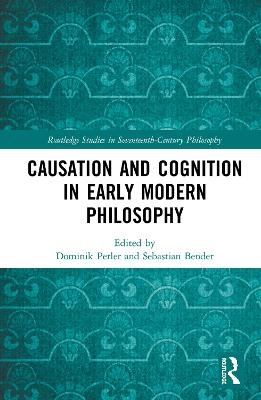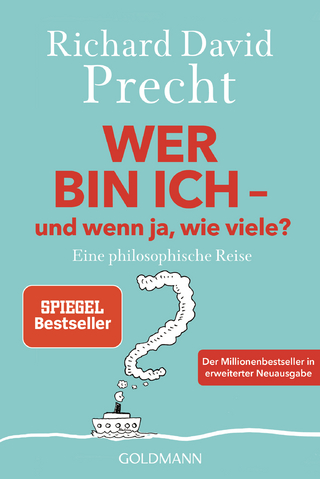
Causation and Cognition in Early Modern Philosophy
Routledge (Verlag)
978-1-138-50534-6 (ISBN)
This book re-examines the roles of causation and cognition in early modern philosophy. The standard historical narrative suggests that early modern thinkers abandoned Aristotelian models of formal causation in favor of doctrines that appealed to relations of efficient causation between material objects and cognizers. This narrative has been criticized in recent scholarship from at least two directions. Scholars have emphasized that we should not think of the Aristotelian tradition in such monolithic terms, and that many early modern thinkers did not unequivocally reduce all causation to efficient causation.
In line with this general approach, this book features original essays written by leading experts in early modern philosophy. It is organized around five guiding questions:
What are the entities involved in causal processes leading to cognition?
What type(s) or kind(s) of causality are at stake? Are early modern thinkers confined to efficient causation or do other types of causation play a role?
What is God's role in causal processes leading to cognition?
How do cognitive causal processes relate to other, non-cognitive causal processes?
Is the causal process in the case of human cognition in any way special? How does it relate to processes involved in the case of non-human cognition?
The essays explore how fifteen early modern thinkers answered these questions: Francisco Suárez, René Descartes, Louis de la Forge, Géraud de Cordemoy, Nicolas Malebranche, Thomas Hobbes, Baruch de Spinoza, Gottfried Wilhelm Leibniz, Ralph Cudworth, Margaret Cavendish, John Locke, John Sergeant, George Berkeley, David Hume, and Thomas Reid. The volume is unique in that it explores both well-known and understudied historical figures, and in that it emphasizes the intimate relationship between causation and cognition to open up new perspectives on early modern philosophy of mind and metaphysics.
Dominik Perler is Professor of Philosophy at Humboldt-Universität, Berlin, and Member of the Berlin-Brandenburg Academy of Arts and Science. His books include Partitioning the Soul: Debates from Plato Leibniz (ed., 2014), The Faculties: A History (ed., 2015), Feelings Transformed: Philosophical Theories of the Emotions, 1270-1670 (2018). Sebastian Bender is Lecturer at the philosophy department at Humboldt-Universität, Berlin. His research focuses primarily on early modern philosophy, in particular on the metaphysics and philosophy of mind of this era. In 2016, he published his first book, Leibniz’ Metaphysik der Modalität.
Introduction
Dominik Perler & Sebastian Bender
1. Suárez on Intellectual Cognition and Occasional Causation
Dominik Perler
2. Descartes on the Causal Structure of Cognition
Alison Simmons
3. Cartesian Causation and Cognition: Louis de la Forge and Géraud de Cordemoy
Tad Schmaltz
4. Causation and Cognition in Malebranche
Stephan Schmid
5. Ralph Cudworth: Plastic Nature, Cognition and the Cognizable World
Sarah Hutton
6. Nothing Is Simply One Thing: Conway on Multiplicity in Causation and Cognition
Julia Borcherding
7. Cavendish on Material Causation and Cognition
David Cunning
8. The Mechanical Mind: Hobbes on Sense Cognition and Imagination
Martine Pécharman
9. Knowing Mind through Knowing Body: Spinoza on Causal Knowledge of the Self and the External World
Daniel Garber
10. The Many Faces of Spinoza’s Causal Axiom
Martin Lin
11. Locke on Causation and Cognition
Jennifer Marušić
12. Embodied Cognition without Causal Interaction in Leibniz
Julia Jorati
13. John Sergeant and Antoine Le Grand on the Occasional Cause of Cognition
Han Thomas Adriaenssen
14. Berkeley on Causation, Ideas and Necessary Connections
Sebastian Bender
15. Hume and "Reason as a Kind of Cause"
P. J. E. Kail
16. Reid on Intentionality and Causation
James Van Cleve
| Erscheinungsdatum | 02.08.2019 |
|---|---|
| Reihe/Serie | Routledge Studies in Seventeenth-Century Philosophy |
| Verlagsort | London |
| Sprache | englisch |
| Maße | 152 x 229 mm |
| Gewicht | 612 g |
| Themenwelt | Geisteswissenschaften ► Philosophie ► Metaphysik / Ontologie |
| ISBN-10 | 1-138-50534-X / 113850534X |
| ISBN-13 | 978-1-138-50534-6 / 9781138505346 |
| Zustand | Neuware |
| Informationen gemäß Produktsicherheitsverordnung (GPSR) | |
| Haben Sie eine Frage zum Produkt? |
aus dem Bereich


